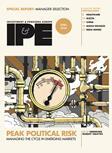Natixis Global Asset Management has changed its name to Natixis Investment Managers to better highlight its multi-affiliate business model.
Natixis Asset Management, a Paris-based affiliate of Natixis Investment Managers, is also rebranding and will be renamed in 2018.
All other affiliates of Natixis Investment Managers – of which there are 26 – will retain their current brands.
In conjunction with the name change Natixis Investment Managers launched a platform around a new brand, Active Thinking. It has also established the Natixis Investment Institute, which will take advantage of new developments in data analysis and visualisation to study the relationships between investor sentiment and investment decision-making.
H2O Asset Management, an affiliate of Natixis IM, recently announced it had acquired a stake in Poincaré Capital Management, a global equity asset manager based in Hong-Kong.
Aktia joins forces with Universal
Finnish fund manager Aktia Asset Management and fund platform Universal-Investment have formed a partnership to bring Aktia AM funds to Germany and other European countries.
The first product available in Germany will be a frontier markets local currency fund. Aktia, an emerging markets specialist, said it intended to launch a range of emerging markets funds for European investors.
Katja Müller, member of the board of directors and head of sales and relationship management at Universal-Investment, said her company was experiencing “increasing demand from international players” to join the distribution platform.
Universal-Investment has launched more than 600 mutual funds with a combined volume of €27bn.
BNP secures Caple for SME platform
BNP Paribas Asset Management has acquired a 10% stake in Caple, an originator of loans to small- and medium-sized companies (SMEs), as part of an initiative from the manager’s private debt and real assets investment group.
BNP Paribas has establihsed an open architecture platform to source loans across multiple origination channels in Europe, including banks and fintechs, and distribute them to institutional investors such as pension funds and insurance companies.
Caple is one of the partners the manager will tap for loans for its platform, which will focus on senior unsecured fixed-rate loans of between €500,000 and €5m.
SME Advanced Solutions, as the platform is called, will initially target SMEs in the UK, Germany and the Netherlands, and plans to broaden out more widely within Europe after that.
BMO commits to cost transparency for LGPS clients
BMO Global Asset Management has signed up to the UK local government pension scheme’s voluntary code of transparency. The code aims to provide a standardised method of reporting investment costs. There were 23 signatories listed at the time of writing.
Berenberg questions performance-fee-only pricing
Analysts at German private bank Berenberg have questioned the potential value of so-called “fulcrum fees” – management charges that vary according to performance. Fidelity and Allianz Global Investors have recently begun introducing such a pricing model on some equity funds. Last month Fidelity announced it had introduced a variable management fee across its entire equity offering, which would see charges fall if funds underperform.
Berenberg’s analysts focused on Allianz’s US equity fund, which bases its performance-based fee on rolling 12-month returns, and suggested that there was unlikely to be much difference between the old and new pricing models after all costs had been factored in.
The analysts claimed that, under this model even a passive fund based on the S&P500 index with a beta of more than 1 – implying slightly more volatility than the S&P500 itself – would have generated performance fees in 74% of 12-month periods in the past 25 years.
“Applying the same approach on a three-year rolling basis (i.e. the methodology that Fidelity plans to adopt) implies performance fee generation in 67% of all 12-month periods,” the analysts added.
Once other fund charges were applied, this passive fund could have a total expense ratio of around 80bps, which was in line with the current average for active equity mutual funds in the US. The costs would be higher still if the strategy delivered any alpha, the analysts said.













No comments yet